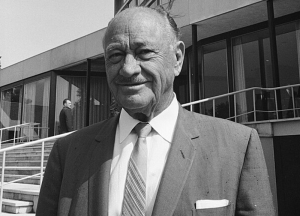Conrad Hilton, the renowned American business tycoon and hotelier, left an indelible mark on the global hospitality industry. Born on December 25, 1887, in San Antonio, New Mexico, Hilton's journey from a small town upbringing to the helm of the world-famous Hilton Hotels chain is a testament to his resilience and entrepreneurial prowess.
Having survived the challenges of the First World War and the Great Depression, Hilton became one of the most successful entrepreneurs globally. His educational background included attending the Goss military school, St. Michael’s College, and the Mexico School of Mines. At the age of 21, he started contributing to his father's store while simultaneously serving as a Republican representative in the New Mexico State Legislature.
After serving in the U.S. Army during World War I, Hilton returned with a vision to build a large business. His initial plan to buy a bank in Texas took an unexpected turn when he purchased his first hotel, the Mobley Hotel in Cisco. The hotel's success prompted Hilton to expand rapidly, overcoming the challenges posed by the Great Depression.
Despite facing financial setbacks during the Depression, Hilton persevered and built a unique hotel empire, each establishment embodying his distinctive style. In 1946, he established the 'Hilton Hotels Corporation' and later the 'Hilton International Company' in 1948. By 1949, Hilton began the international expansion of his hotel chains, marking a significant milestone in the global hospitality landscape.
Hilton's commitment to high standards for accommodations and service made Hilton Hotels the first international chain to set such benchmarks. His empire comprised 188 hotels in 38 American cities, including iconic establishments like the Palmer House in Chicago, Mayflower Hotel in Washington DC, Waldorf-Astoria, and Plaza Hotel in New York. Additionally, Hilton had 54 hotels outside America.
In the 1960s, Hilton handed over the management of Hilton Hotels to his son, who later announced the donation of 97% of the family fortune to the Conrad N. Hilton Foundation. This foundation, established by Hilton, focuses on improving the lives of disadvantaged individuals worldwide, exemplifying Hilton's commitment to philanthropy.
Hilton's legacy extends beyond his hotel empire. He passed away at the age of 91 on January 3, 1979, leaving behind a personal fortune of around $1 billion. Today, Hilton Worldwide boasts over 6,000 hotels, a diverse portfolio of brands, and a well-known loyalty program estimating roughly $3.5 billion today.
In recognition of his contributions, Hilton received numerous honorary degrees from prestigious universities worldwide. His foundation continues to award the Conrad N. Hilton Humanitarian Prize and spearheads initiatives for education, homelessness, and the visually impaired. Hilton's enduring impact on both the hotel industry and philanthropy is a testament to his enduring legacy.




















